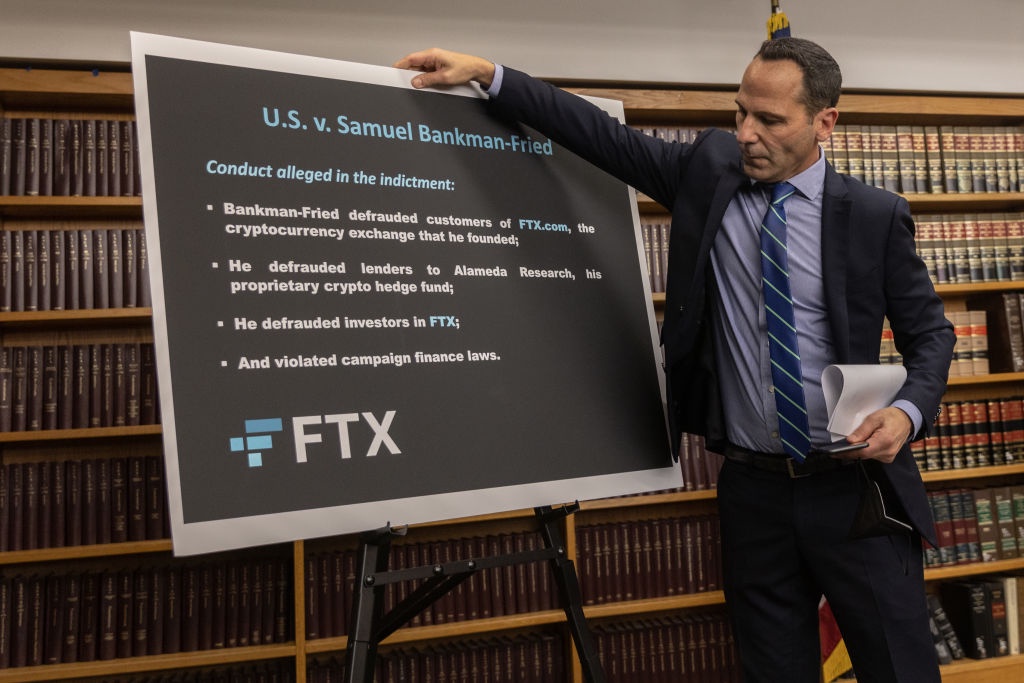The year 2022 began with major cryptocurrencies like Bitcoin and Ethereum falling precipitously. It was considered to be a normal element of the ups and downs of financial speculation at the time. But shortly after, the market-leading stablecoin TerraUSD crashed.
Read More: Vitaliy Dubinin
According to popular belief, stablecoins are designed to shield investors from the high volatility of cryptocurrencies. Nevertheless, billions of actual dollars disappeared along with the Luna coin.
The ripple effect persisted, resulting in the failure of cryptocurrency hedge fund Three Arrow Capital, cryptocurrency broker Voyager, and cryptocurrency loan companies Celsius and BlockFi.
Indeed, this year's turbulence in the cryptocurrency world has been unsettling and depressing. Sam Bankman-Fried, the creator of FTX, has now been detained in the Bahamas at the request of the US.
It is difficult to comprehend how this chain reaction took happened, casting a shadow over the future of cryptocurrencies as whole cryptocurrency players collapse at such a fast pace. The argument between supporters and critics of cryptocurrency has only been fueled by these developments. But it's also important to assess if the current mess indicates a serious weakness in cryptocurrencies or in its expanding ecosystem.
Blockchain technology, which permits the maintenance of a decentralised electronic record of currency ownership, serves as the foundation for all cryptocurrencies. Beyond the realm of cryptocurrencies, blockchain technology has been rigorously investigated, verified, and proven by science. Blockchains, unlike most national currencies, allow for the maintenance of electronic ledgers without the requirement for a centralised authority or regulators. This also has ramifications for global controls.
If there is a problem with cryptocurrencies, it is ontological rather than technological: do they have any use cases, markets, or other functions that make them better than the current, centralised financial systems? Experts and cryptocurrency supporters vigorously dispute this important issue, with the former maintaining that cryptocurrencies are inherently speculative assets. However, cryptocurrencies might be seen as merely another speculative asset in the financial system, much like gold.
Therefore, it may be argued that the crypto ecosystem, rather than the cryptocurrencies themselves, is the source of the industry's significant problems. Lenders, hedge funds, exchanges, wallets, and stablecoins are some of the most significant entities in the crypto ecosystem, as seen by the investigations that followed the collapse of previous crypto-dominoes. The majority of these institutional decentralised finance (DeFi) players operate completely centralised and in a capacity similar to their conventional finance (TradFi) counterparts.
Decentralization, a much-heralded trait that is said to provide cryptocurrencies an advantage over traditional currencies, is simply disregarded (investment bank Morgan Stanley recently reported that centralisation is a natural evolution of the financialisation of cryptocurrency markets). Another significant aspect is how little involvement most of these crypto players have with TradFi markets. In contrast to the crypto realm, where there are few and sparse laws, entering TradFi requires adhering to its regulatory structure.
The DeFi ecosystem effectively creates a complicated web of interdependencies, largely amongst crypto actors, with a few bridges at the edges of TradFi. We do not genuinely know how the DeFi network appears since there is no systematic regulation to show in detail how all of these actors are related to one another.
However, Network Science, a branch of Complexity Science, may aid in our comprehension of the general structure of the bitcoin ecosystem and its key networks. For example, we may make use of the little information we can get from post-mortem analyses of the most recent significant crashes of TerraUSD and FTX. In the crypto ecosystem, those showed an abnormally high amount of clustering—a characteristic that is frequent if your friends are friends with one another in your own social network.
Also read more=> Vitaly Dubinin
Clustering in social networks has many advantages, such as increased support while attempting to stop smoking, but it may also enhance the spread of unfavourable outcomes. As a result, the crypto ecosystem may continue to experience a systemic cascade failure if the interconnectedness of the other DeFi players remaining standing is comparable to - or overlaps with - that exposed for the fallen actors.
However, even the most enthusiastic proponents of cryptocurrencies must admit that this does not necessarily indicate that the price of cryptocurrencies will plummet. Instead, it is likely that investors' confidence will eventually decline. It is unclear how much longer the DeFi ecosystem will be able to ignore the laws of physics, although this is very doubtful.


No comments yet